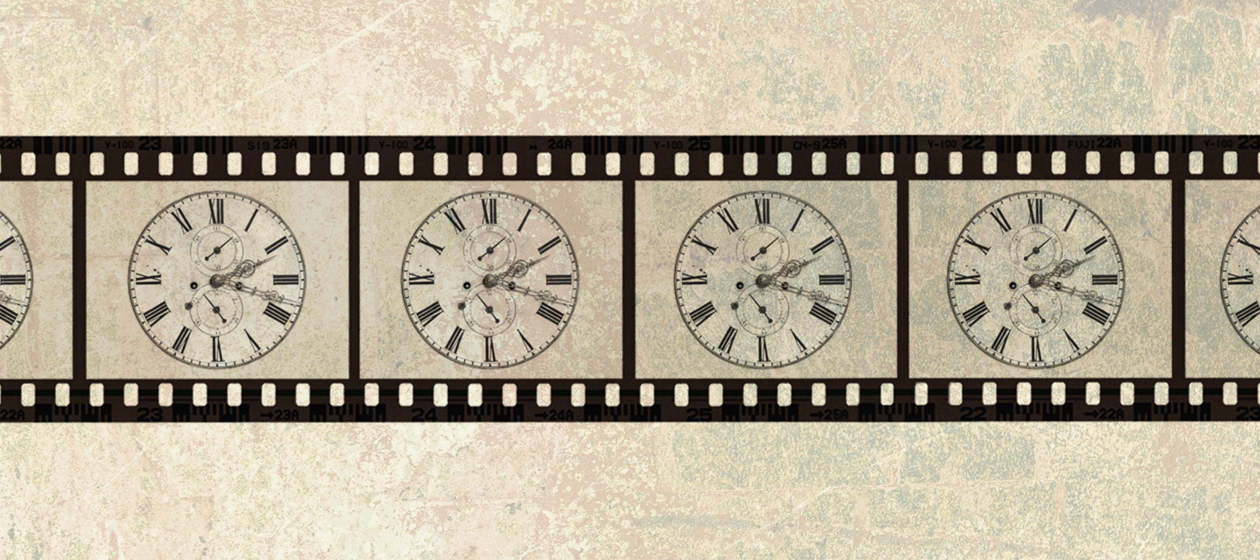What it's like to watch a 14-hour movie in one sitting
What is time, really? And other thoughts from the front.


I love long movies. Three-hour movies. Five-hour movies. Movies that make time meaningless. Movies that require you to set aside an entire day — an entire weekend — just to watch. I find it intoxicating not to give a moment's notice to that niggling curiosity of is this almost over?, because it's understood that it isn't, and it won't be, at least not for a very, very long time.
There are different kinds of long movies — many aren't intended to be watched all the way through, instillation pieces like The Clock or 24 Hour Psycho, which run a day or longer. Other films are conceptually part of the same whole, but are released in installments: Nymphomaniac or Arabian Nights. Others are released for TV: Twin Peaks: The Return is actually a movie, it has been argued (unconvincingly, in my mind). And then there are the most formidable of all: films that are truly, inarguably, a single entity. Fanny and Alexander, at more than five hours; Sátántangó at seven; West of the Tracks at more than nine; Out 1 at 13.
Now another film joins the ranks of the marathon movie. The New York Film Festival announced, to the surprise and bewilderment and delight of many, that it will be showing the entirety of La Flor, an 807-minute film with 40 (!) minutes of credits, by Argentinian director Mariano Llinás, as a part of its main slate in October. Although the festival is choosing for audiences to watch those 14-plus hours in a humane three to eight segments, I decided to watch it in a single day, all in one go, with my friend, the critic Scout Tofoya, and my boyfriend, Forrest Cardamenis.
The Week
Escape your echo chamber. Get the facts behind the news, plus analysis from multiple perspectives.

Sign up for The Week's Free Newsletters
From our morning news briefing to a weekly Good News Newsletter, get the best of The Week delivered directly to your inbox.
From our morning news briefing to a weekly Good News Newsletter, get the best of The Week delivered directly to your inbox.
Why? Because we could. But also because we wanted to view La Flor as a whole entity, one not interrupted by the trivialities of cleaning the litter box, commuting to work, and watching part of the film tired, at the end of the day.
This is what happened.
Hour 1 (11 a.m.)
What's happening in the movie: Director Mariano Llinás introduces the film by saying it is structured in six "episodes": The first four will have no ending; the next will have a beginning, middle, and end and be a remake of a classic French film; and the last section will have no beginning, but an end. The first section is a B-movie about a mummy.
A free daily email with the biggest news stories of the day – and the best features from TheWeek.com
What's happening to me: It's late morning, and we are bright-eyed adventurers setting out into an uncharted realm of le cinema. Few people have embarked on the journey we are about to, not in this way, not like this. We've been warned it is madness. But the couch is supple, the coffee chilled, and the day outside a bright, sapphire, first-day-of-fall stunner, which we will miss completely. We are young and foolish. We hit "play."
The DVD drive initially does not read the first disc of La Flor, and although none of us say it, we all think, Oh good, this means we don't have to watch it today. But then the disc works in the computer, and our last fleeting hope at having a normal day vanishes. Fourteen hours stretch out in front of us, and we think we can see the other side.
Hour 2 (12 p.m.)
What's happening in the movie: Episode one's B-movie ends; episode two, the musical portion, begins.
What's happening to me: Somewhere around hour two is when my normal movie-watching brain begins to get antsy. At 90 minutes, a "normal" movie would be wrapping up, even ending. The B-movie does end — or cuts off abruptly — and a new part begins, but we are far, far from any ending.
I've also forgotten to tweet about how I am watching La Flor, so that everyone can know and be awed by my stupidity, so I dash something off.
Hour 3 (1 p.m.)
What's happening in the movie: A lot of singing, a subplot about scorpions.
What's happening to me: It's around the beginning of hour three that I begin to wonder, Are we there yet? This is a very bad sign — I'd hoped it would be 5 p.m. before I started wanting to check the clock. At 1:47 p.m., we decide to blame our restlessness on our empty stomachs and order Chinese food off my phone.
Hour 4 (2 p.m.)
What's happening in the movie: Part one ends around minute 206. This is when people in movie theaters are supposed to go home, to begin again with part two a different day. We do not stop. We will never stop. The third episode: A 342-minute Jean-Luc Godard-inspired spy/assassin section that takes place "somewhere in South America" at "sometime in the '80s."
What's happening to me: This is the only time in the whole 14 hours that I begin to nod off. The spy movie section takes place in a sleepy, gray part of South America. The voice-overs become lyrical and novelistic, the soundtrack is like a lullaby. Scout makes me a coffee because he sure isn't going to suffer through watching the whole 14 hours if I'm not awake for them. Sleeping is forbidden, a blessed passage of time without consciousness.
Around 2:30 p.m., I am jolted back to life by the doorbell. Seamless delivers our Chinese food and we eat General Tso's bean curd in front of the TV, bravely soldiering on without a break.
Hour 5 (3 p.m.)
What's happening in the movie: The spy movie continues.
What's happening to me: While I wasn't sure about the first two episodes, this section is where La Flor really starts to click for me. I begin to trust that these disconnected "episodes" have a point and are serving a place in the larger, flower-like sketch that Llinás laid out at the beginning of the film. It's all beginning to come together, I think excitedly. Or maybe it's the Stockholm Syndrome setting in.
Hour 6 (4 p.m.)
What's happening in the movie: ???
What's happening to me: We have never known a life other than watching La Flor. The sun rose on this day, eons ago. Each one of us contemplates the concept of time privately, marvels at the way it is just a construct, a flat circle, an unknowable. What is time, really? What is 14 hours in the lifespan of a universe?
At some point a beer appears in my hand. I spend a long time thinking about where I should put my feet to be comfortable. I am deeply moved by a section about constellations in the southern hemisphere, almost to the point of tears. Then someone says out loud "we still have eight more hours," which is very rude.
Hour 7 (5 p.m.)
What's happening in the movie: Another assassin's backstory, this one rather twee and hilarious.
What's happening to me: Someone looks up on their phone that the credits of La Flor are 40 minutes long and we all groan.
At the end of this hour, we hit minute 419 — six hours and 59 minutes, the runtime of the Hungarian film Sátántangó — and La Flor officially becomes the longest movie I've ever watched in one sitting.
And we're only halfway there.
Hour 8 (6 p.m.)
What's happening in the movie: The finale to the assassin/spy portion.
What's happening to me: Scout reveals he watched a movie today before we started La Flor. Nobody says anything for several minutes.
Hour 9 (7 p.m.)
What's happening in the movie: There is a car in a tree.
What's happening to me: Shortly into the film's fourth section I announce, "This is the worst section of the movie." I'm wrong. This becomes the best hour of the movie so far, a kind of meta-commentary on the filmmaking process, the possibilities of visual storytelling, and a lot of great jokes about trees and ants. I am laughing so hard that my eyes water. "This was so worth it!" we keep saying at random intervals.
Then ... we run out of beer. It is an urgent situation, one we all agree must be remedied immediately. We pause the movie to do a beer run and to feed our neglected cats across the street.
Hour 10 (8 p.m.)
What's happening in the movie: There is a psych ward where every patient embodies a different Greek god. A story of Casanova's life is re-enacted. Part two ends around minute 548. One part to go!
What's happening to me: The couch is my enemy. I fantasize about the TV being turned off. Bathroom breaks are for the weak. Ten hours is longer than I've done anything ever.
I eat leftover Chinese food.
Hour 11 (9 p.m.)
What's happening in the movie: Episode 5 — the French film remake with a beginning, middle, and end — finally begins.
What's happening to me: We've been taking bets throughout the movie as to which French film is remade in La Flor's fifth section. When we realize it's A Day in the Country, we all whoop — Scout had guessed it a few hours, or maybe days or lifetimes, earlier. Then we get really, really quiet because the section is a silent remake. A silent remake 600 minutes into a movie? Yes.
Hour 12 (10 p.m.)
What's happening in the movie: A silent Western shot through what looks like thin leather or a transparent cloth to achieve an old-timey effect.
What's happening to me: Around 10:30 p.m., we reach the final disc of La Flor. We cheer. We cry. We try to high five with beer bottles in our hands. This is it.
We also perk up, even though episode six is another silent segment. But none of us want to have our minds wandering during the last hour-something of La Flor. We want to finish this marathon at a sprint. In preparation, we descend on a bag of Hint of Lime chips like a pack of wolves.
Hour 13 (11 p.m.)
What's happening in the movie: The movie technically ends. Forty minutes of credits over the crew disassembling the shoot begin.
What's happening to me: At a certain point during this section, we pass minute 775 and La Flor officially becomes the longest movie I've ever seen after Out 1, which took me two days to complete.
The Western comes to an end, and the camera spins away — still rolling, upside down, so we can dizzily watch the four actresses (who are in every single episode but the Day in the Country remake) celebrate the wrap. We watch gear get picked up, and we watch a man smoke a cigarette in a lawn chair, with his only companion a dog, as the credits roll over the scene.
In La Flor's last hurrah, we watch the sun set in real time. And although it set outside our apartment hours ago, we viewers are in a weird twilight, too — the film is over, but there are 40 minutes remaining, so none of us dare leave.
Hour 14 (Sometime after 12 a.m.)
What's happening in the movie: Fin.
What's happening to me: It is technically tomorrow when the TV at last goes dark for a final time (at least before the disc restarts, at which we all scream "NO" and jump to turn it off). Our hearts have beat some 67,200 times since La Flor began. We have aged hundreds of years. We are all, somehow, closer after this experience.
We argue, for awhile afterward, about if La Flor needed to be 14 and a half hours long (maybe), if it was brilliant (quite possibly), if it should be offered to audiences all in one go (yes, we cackle).
At last, it is time to leave. But before we can, Scout hands me his copy of Shoah. It is nine hours long.
A piece of cake.
Jeva Lange was the executive editor at TheWeek.com. She formerly served as The Week's deputy editor and culture critic. She is also a contributor to Screen Slate, and her writing has appeared in The New York Daily News, The Awl, Vice, and Gothamist, among other publications. Jeva lives in New York City. Follow her on Twitter.
-
 Political cartoons for December 6
Political cartoons for December 6Cartoons Saturday’s political cartoons include a pardon for Hernandez, word of the year, and more
-
 Pakistan: Trump’s ‘favourite field marshal’ takes charge
Pakistan: Trump’s ‘favourite field marshal’ takes chargeIn the Spotlight Asim Munir’s control over all three branches of Pakistan’s military gives him ‘sweeping powers’ – and almost unlimited freedom to use them
-
 Codeword: December 6, 2025
Codeword: December 6, 2025The daily codeword puzzle from The Week
